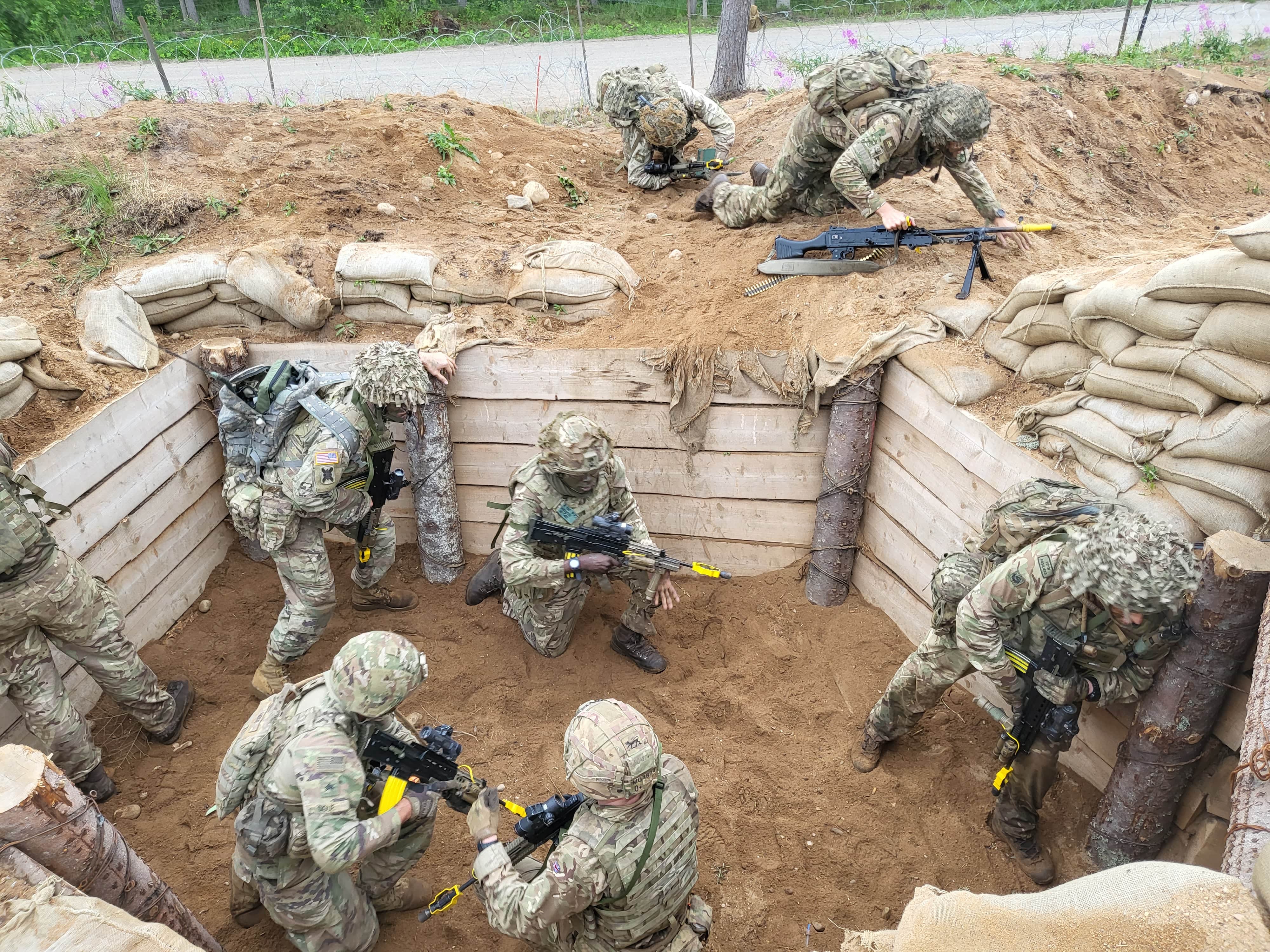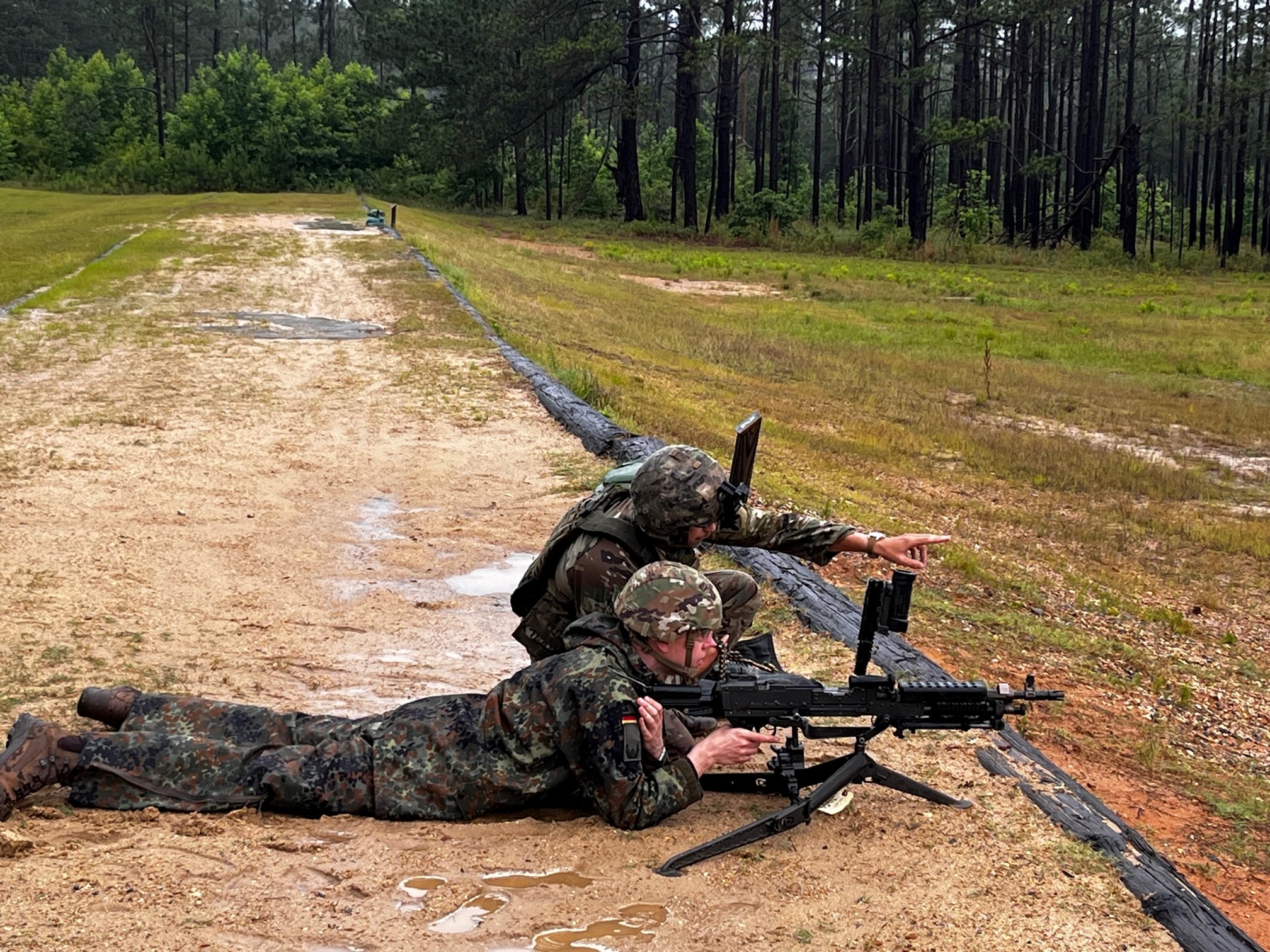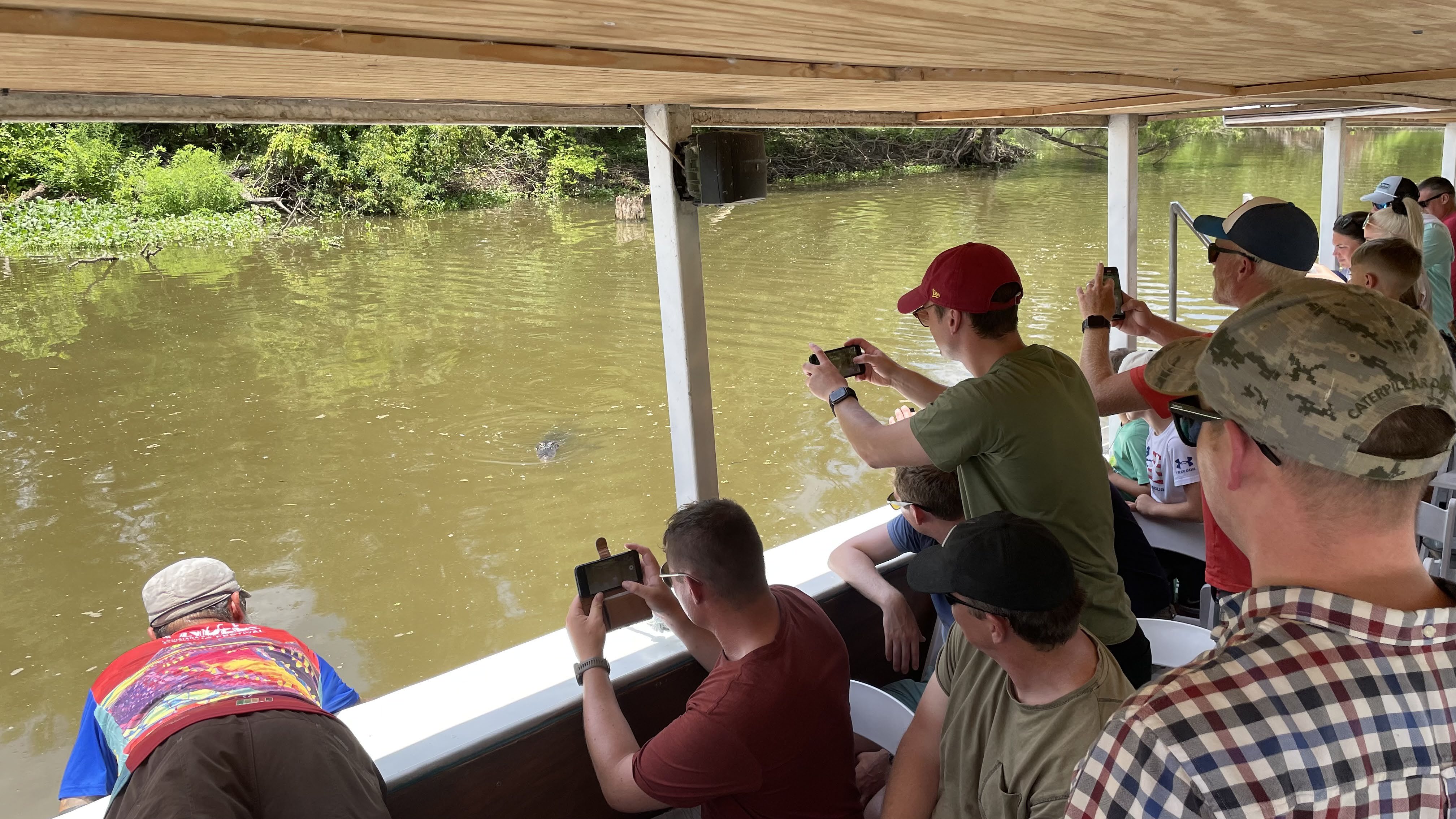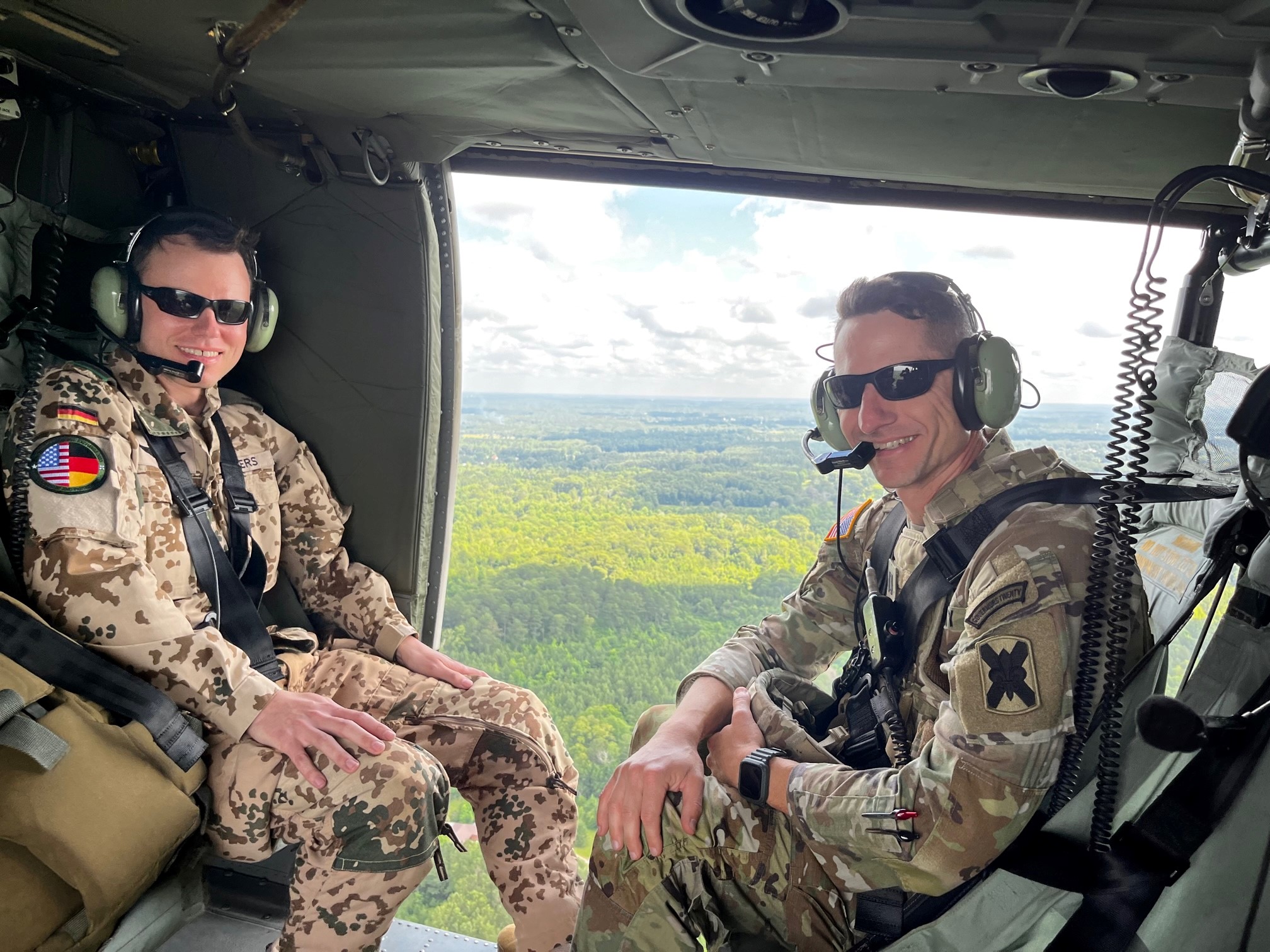La. Guard Soldiers build relationships with exchange program
By Staff Sgt. Noshoba Davis, Louisiana National Guard Public Affairs Office
PINEVILLE, La. – During annual training each year, select Soldiers from the Louisiana National Guard conduct an exchange with partnering countries for a chance to train and experience the culture of the host nation’s military.
 The Military Reserve Exchange Program is a Department of Defense program that provides National Guard and Reserve Soldiers the opportunity to train with similar units and enhance Soldiers’ ability to work and communicate with each other. Some of the countries that participate in this program are the United Kingdom, United States, Estonia and Germany.
The Military Reserve Exchange Program is a Department of Defense program that provides National Guard and Reserve Soldiers the opportunity to train with similar units and enhance Soldiers’ ability to work and communicate with each other. Some of the countries that participate in this program are the United Kingdom, United States, Estonia and Germany.
This year, approximately eight Soldiers between the 256th Infantry Brigade Combat Team and the 225th Engineer Brigade participated in the MREP.
Capt. Richard Ruot learned about the program last year when German officers were attached to his unit for their exchange.
“I have always wanted to go to Germany, and I think being able to learn and train with NATO allies will open a large perspective about how they conduct their operations and tactics,” said Ruot, who is scheduled to do his exchange in September. “I’m ready to see what we can learn from each other.”
The goal of the MREP is to integrate participants into the host country’s reserve forces to increase interoperability, strengthen partnerships and enhance professional development.
Capt. Zachary Jongema with Headquarters and Headquarters Company, 3rd Battalion, 156th Infantry Regiment, 256th Infantry Brigade Combat Team, has served as a host for German counterparts participating in the MREP for the past two years.
“I’ve assisted my battalion with host duties, and wanted to learn more about the German Army,” said Jongema. “The thing I’ve enjoyed the most is learning about the different procedures between the armies.”
As a host, Jongema ensured that the visiting officers made it to all training events during their exchange. These events included weapons familiarization and qualification, medical training, team and squad live fire and rides on a UH-60 Black Hawk.
Before participating in the MREP, participants must submit an application packet that contains but is not limited to an official photo, current automated record brief, military biography, current Army Combat Fitness Test scorecard and an international programs application form.
Once selected, Soldiers are paired with service members from their host nations with similar skill sets. The goal is to enhance leader development while expanding training opportunities that enhance the Soldiers’ understanding of the partner nation’s abilities and improving the ability to work and communicate with the military individuals of the host nation.
“My biggest benefit was the interoperability piece. I had never considered just how crucial it was to nail down how our forces interact and how deep that operability must go,” said 1st Lt. Carter Shields, executive officer of C Troop, 2nd Squadron, 108th Cavalry Regiment, 256th Infantry Brigade Combat Team. “After this exercise, I have seen what we can do when we combine our tactics fluidly. Overall, it has been some of the best training I believe I have received in my military career.”
Each exchange is a unique opportunity and experience. According to Shields, he learned new tactics and created several strong relationships with the Soldiers.
“I exchanged with the United Kingdom’s Fifth Fusiliers, and we spent the exchange in Estonia at Operation Baltic Fist,” said Shields.
While the 256th Infantry Brigade Combat Team welcomed Soldiers from Germany and the United Kingdom, the 225th Engineer Battalion also welcomed six Soldiers from the United Kingdom’s 65 Works Group Royal Engineers to train with them during annual training in early July.
Each Soldier had a different reason for wanting to participate. For LCpl Stuart Penketh, a geologist with the 65 Works Group Royal Engineers, there was a personal connection to the southern states.
“My grandad was severely wounded during the Korean War after finding himself behind enemy lines, and a guy from Alabama found him,” said Penketh.
He explained that his family looked for that Soldier but were not able to locate him before his passing. Penketh said there was communication between the two families after locating the Soldier’s family.
“My grandad was very close to me, and I just wanted to come to the southern states…it just meant a lot to me,” said Penketh.
The Soldiers from the United Kingdom were brought to multiple job sites and worked with the 225th Engineer Battalion on each site.
“I’m learning something new. I’m a below ground specialist, so I come out to these jobs and I’m actually building something above ground,” said Penketh. “By getting the transferable skills that I’ve learned here, I can now go back to my unit and share my experience.”
The 65 Works Group Royal Engineers’ Lt. Samuel Wiseman explained his biggest challenge was integrating into a platoon that already had leadership and not serving as an overseer.
“Trying to make sure you add input without overstepping the mark because there’s already a command structure in place has been the most challenging thing for me,” said Wiseman. “Operating in a new role, instead of serving as an overseer, was an adjustment for me.”
Despite the adjustment, Wiseman said that his integration into the unit was a very welcoming experience.
“The unit has been extremely helpful in both my communication and transportation. They’ve made me feel like I’m one of the team and have integrated me well. The whole experience has been really positive. I feel at home.
Wiseman said the biggest benefit for him as a leader in the exchange is understanding how another NATO partner works and trains.
“I’ve only had experience within the British Army, and although we might have people who have augmented us, I haven’t seen how another military operates,” said Wiseman. “It is really useful to see how another Army exercises different skills.”
 Upon completion of training, the 256th Infantry Brigade Combat Team and 225th Engineer Battalion each planned a culture day for the visiting Soldiers that included touring the cities of New Orleans and Lafayette, swamp boat tours, sampling local cuisines, a walking tour of the French Quarter and visits to local historical sites.
Upon completion of training, the 256th Infantry Brigade Combat Team and 225th Engineer Battalion each planned a culture day for the visiting Soldiers that included touring the cities of New Orleans and Lafayette, swamp boat tours, sampling local cuisines, a walking tour of the French Quarter and visits to local historical sites.
“My biggest takeaway from this training is that the international interoperability is a huge thing we should focus on as NATO allies,” said Shields. “We should always strive to focus on working together because when we are all needed, we will be working together. The smoother we can operate, the safer we will be and the greater the effect we can have.”

